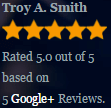If you invoke the Fifth Amendment, you are basically employing the Miranda Rights. Miranda Rights enable those taken into custody by police for questioning to remain silent. But why would you want to invoke these rights under the Fifth Amendment? For starters, speaking to police may somehow incriminate you in a crime, even if you had nothing to do with it. Without a lawyer present, you may go down a line of questioning that reduces your credibility and implicates you in unlawful activities. If you find yourself in the police custody, you may want to use your rights to have a lawyer present and to remain silent to best protect yourself and your interests. For more information on the Fifth Amendment and Miranda Rights, read on.
What Are Miranda Rights?
I’m sure everyone reading this is familiar with what’s said when police officers recite the Miranda rights to someone under suspicion of a crime. Hopefully not because we’ve heard them in person too often, but more likely because they are present on countless TV shows and films. They start off with “You have the right to remain silent…”
But what are Miranda rights, exactly, and what they do mean?
First, a police officer must read a person his or her Miranda rights to inform them that they are being taken into custody. Second, under police custody, the person can exercise two fundamental rights at this time:
- The right to remain silent
- The right to request attorney representation
These rights protect the person in custody from possibly incriminating oneself, as noted earlier. If a police officer fails to recite the Miranda Rights before taking a person into custody, a prosecutor cannot use the person’s words as evidence in court. If you do decide you want to speak with police, consider having a lawyer present before you start talking.
When Should You Use Miranda Rights?
You should exercise your right to remain silent and have an attorney present during questioning whenever the police have chosen to read you your Miranda rights.
No matter how trivial you may think the situation you’ve found yourself in may be, there is a chance it can escalate without proper counsel.
If you are ever unsure of whether you should have a lawyer present, or even sure you are innocent, ask to have one with you before you speak to the cops.
Please note, not speaking to the police at all does not invoke these rights. You must first state that you are choosing to remain silent and request a lawyer present. If you acknowledge the rights read to you and continue to speak, your words can count against you if the case goes to trial.
What (if anything) should you say to authorities if they arrest you?
If you find yourself in a position where you’re under arrest, it’s almost always best to say nothing. Alternatively, say as little as possible and nothing relating to the circumstances into custody.
You can answer basic questions to identify yourself to law enforcement and request any personal belongings, to lock up your home, or any other essential things you need to tie up if you’re about to leave for the police station.
Outside of these things, the only other words you should say is, “I’d like to speak with an attorney before answering any questions.”
Once you’ve made it clear you will only answer questions after speaking with your attorney and having him or her present, law enforcement must cease all questioning until your lawyer arrives so you can take counsel.
Should You Request a Lawyer If You’re Innocent?
Yes! As a rule of thumb is: you should always request legal representation if you’ve found yourself in a legal situation where they read you your Miranda rights.
You will know that you’re innocent, but remember, the police and prosecutors do not. If you’re a suspect, they will be putting together circumstantial evidence that may make you look guilty.
It’s not your job to defend yourself; that’s why we have attorneys. Answering questions without an attorney present can get you into trouble. Experienced detectives know how to “twist” answers and ask difficult questions to create ambiguity, which often looks like doubt.
Don’t take offense to this. It’s the game of cat and mouse that law enforcement sometimes plays with suspects, which is why you have the right to an attorney who will help you prove your innocence without falling into any trouble.
Learn More About Your Fifth Amendment Rights
Do you believe police are wrongly accusing you of a crime? Did the police fail to inform you of your rights to remain silent or have an attorney present? Speak to Troy A. Smith, a criminal defense lawyer who helps the citizens of New York. The legal team at his firm can help with a variety of criminal offenses, including assault, drug crimes, robbery and more. Call (212) 537-4029 if you have questions about your current case. Email today for a free case consultation.












